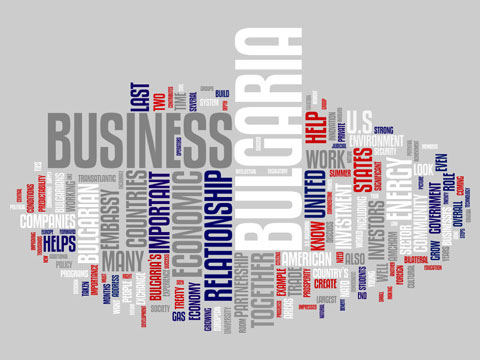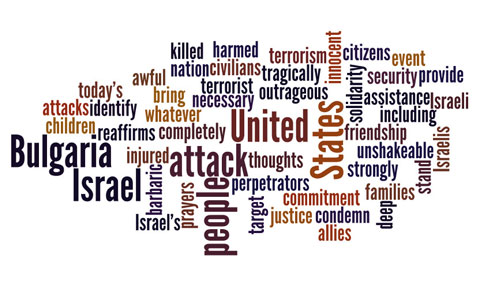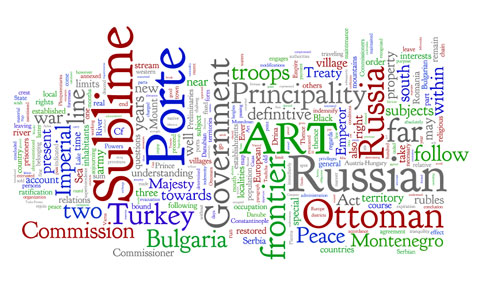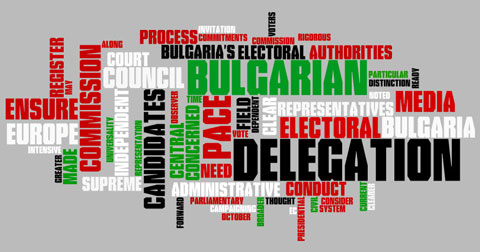Outgoing British Ambassador Steve Williams shared some personal reflections in his farewell remarks to the Atlantic Club on 14 March. He drew upon his experience in the country in two separate terms, 1984-87 and 2007-11 to describe some of the changes he has observed, then imagined what a visit might be like 10 years hence. The perspective of a thoughtful man who loves Bulgaria is well worth taking to heart.
Full text follows the wordle.
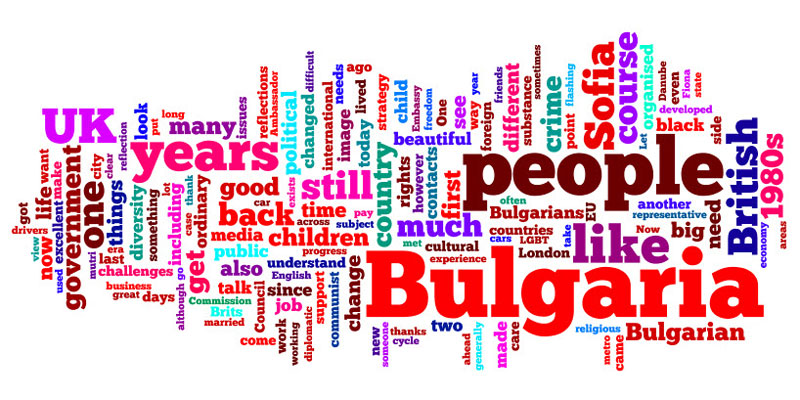
7 YEARS IN BULGARIA: SOME REFLECTIONS
Speech by the British Ambassador, Steve Williams, at the Atlantic Club, Sofia, 14 March 2011
Introduction
I would like to express my thanks to the Atlantic Club for inviting me to share some reflections at the end of my mandate as British Ambassador here. It is a great honour. I would like to thank all the sponsors of today’s event. And most of all to thank all of you for coming.
Before I start my speech I would like to express my deepest sympathy to the people and government of Japan for the truly dreadful tragedy that has hit their country. In this hour of need, Japan can count on the support of its friends around the world, including the UK and Bulgaria, as it starts to re-build after this tragedy.
I have spent almost 7 years of my adult life in Bulgaria, from 1984 to 1987 and from 2007 to today. My wife, Fiona, and I came here in January 1984, one month after we got married, so we have spent a quarter of our married life here. We had our first child while we were here. Sofia was our first and, as it has turned out, our last diplomatic posting. By happy coincidence, two of the sponsors of today’s event form part of my life story. In the 1980s there were only two British companies represented here –Shell and ICI, which went on to become Astra Zeneca. The godparents of our first child were the then Shell representative and his wife. So Sofia and Bulgaria have been, and always will be, a very significant part of my personal and professional life.
The title of my talk – “some reflections” – is deliberately pretty broad so as to give myself maximum flexibility to range freely. It probably confirms the old joke that a diplomat is someone who, generally speaking, is generally speaking! I could reflect on how I have changed as a person in the 27 years since I first set foot on the tarmac at Sofia airport. I could reflect on how my own country, the UK, has changed in that time, or on how my employer, the Foreign Office, and more broadly, diplomacy has changed. All of these things in themselves could be the subject of an interesting talk.
I could also talk about the big policy issues that feature in the bilateral relationship between Bulgaria and the UK, as NATO allies and EU partners:
- side by side in Afghanistan;
- trying to promote stability in the Western Balkans and now, of course responding to the major changes that are taking place in Tunisia, Egypt, Libya and elsewhere in the EU’s Southern Neighbourhood;
- working together on common challenges like the economic crisis and climate change;
- working together as operational partners to confront common threats from terrorism, weapons proliferation, drug trafficking, and smuggling of goods and people;
- promoting trade and investment, and strengthening even further the business partnerships between UK and Bulgarian companies.
But I am not going to talk about those things either.
What I want to talk about – and which I hope will be of interest to you – is my personal reflection on how Bulgaria has changed. And although I will anchor some of it in the past, I want to be forward looking, at what it means for the future. And I emphasise, that these are personal reflections, not intended to be interpreted as a statement of British government policy. I would like to offer reflection on four broad themes: people-to-people contacts; diversity; hierarchy; and image.
Human contacts
When I returned to Bulgaria three and half years ago after an interval of 20 years, I was often asked what was the biggest change that I noticed? In terms of my everyday life as a foreigner here, the answer was clear: it was the ability to have normal contacts and friendships with ordinary people. In the 1980s, we western diplomats were “the enemy” and we lived our lives in an expatriate bubble. Fiona and I lived in a small apartment block near Orlov Most, which was unusual, as most diplomats lived in a diplomatic ghetto on Jolio Curie. Our neighbours were ordinary Bulgarians, yet in over 3 years we did not get beyond polite greetings in the communal entrance hall. And for good reason. They knew – and we knew – that they could get into trouble if they got too friendly with us.
Only now, coming back to Bulgaria, do I understand how much trouble. In the 1980s the state security apparatus used to waste vast amounts of scarce state resources following people like me. One of my jobs at the Embassy was to meet those people who – for various reasons – were disaffected with the regime, and wanted to speak to a Western Embassy. Some were agents provocateurs, most were genuine. These people were at particular risk. I have discovered that at least one person that I met was executed.
When discussing the Communist era since coming back here, I have been struck by how attitudes towards Communism are most polarised among the over-60 generation. This is not surprising. Those whose families experienced persecution from the Communists are strongly anti-communist. But some others have more mixed feelings. They have seen the negatives of the market economy – the gradual breakdown of the family unit, drugs, crime, growing income differentials – without benefiting themselves from the economic growth and the increased freedom since the transition. I can also fully understand those sentiments. But when I heard about individuals being executed by the communist regime, I realised that, however imperfect the transition, however big the challenges that still lie ahead, freedom and democracy are things to be treasured. It is something which we in so called Old Europe perhaps don’t pay enough attention to. We sometimes take these freedoms for granted. Bulgarians, more than Brits, know what it is that the people of Egypt, Tunisia and Libya are striving for today. And they understand that although those countries too – for different reasons – face long and difficult roads ahead, the prize of democracy and greater individual freedom is worth it.
Let me make this point in a different way. The inherent Bulgarian national character – as far as one can generalise about these things – is the same as it was in the communist era: the same sense of humour, the same beauty, and the same emotions. But under communism this could only flourish privately: publically everything was shades of grey. I recently came across a photo that I took in the 1980s from the top of NDK. The plaza area looked beautiful: well kept flower beds, neat clean paths, smart sculptures. Today it’s still nice, but not quite as pristine. But the big difference is that in my photo there were literally no people in the picture. The plaza was empty. Today it teems with life: skateboarders, ice rinks, musicians, exhibitions, children playing. In short, colour, emotions and activity. I know which version of the park I prefer!
Despite the difficulty of having contact with ordinary people in the 1980s, I was lucky enough with my job to be able to have a wider range of contacts than would have been the case had I only been doing political work, which, frankly, was pretty dull. That is because I was also the cultural attaché. In those days the British Council did not have their own office here, so I was their representative. I either did such a good job or such a bad job that when I left the British Council decided to send their own representative. Indeed by another strange twist of fate, their first office was in our old flat by Orlov Most. Last month the British Council celebrated its 20th anniversary of opening its own office here in Sofia. Maybe I am therefore biased, but I would like to pay tribute to the British Council for their outstanding work in promoting people to people contacts, in supporting the reforms in Bulgaria, and in strengthening the educational and cultural ties between our two countries.
In the 1980s English was well down the list of foreign languages, even though there were some excellent English language secondary schools. And if there were any Bulgarian students at UK universities, I certainly never met or heard about them. Now English has officially overtaken Russian as the most spoken foreign language in the Bulgarian public sector. Record numbers of Bulgarian students are studying at UK universities. Tens of thousands of Bulgarians live in the UK. I sometimes here concerns about this: that Bulgaria is being emptied of its young talent. In the UK we periodically used to have similar worries about a brain drain, to the US and elsewhere. I don’t think you should worry about this. First of all, because you cannot stop it. But secondly, and more importantly, because most of these young people sooner or later will come back – because this is their homeland. And when they do, they will bring their international experience to this country which will benefit enormously as a result. I have met many people in this category – including members of both the current and previous governments. They didn’t have to come back – they wanted to come back. Young people are more likely to return if they see that the benefits that they went to look for overseas are increasingly available at home in cities with suitably ambitious aims to become more open and more international. That is why I very much welcome the active participation of Sofia Municipality in the British Council’s Open Cities programme.
Let’s look at flows of people in the other direction. In the 1980s you could probably count on one hand the number of Brits that lived permanently in Bulgaria. Now we estimate there are about 7,000 permanently settled here, mostly in the countryside, and many thousands more that own holiday apartments on the Black Sea coast or the ski resorts like Bansko and Pamporovo. On top of that around 400,000 Brits come here every year as tourists – many, of course, on package holidays to the winter and summer resorts, but increasingly as independent travellers, to experience the extraordinary beauty and diversity, both natural and cultural, of this country. There are 4 airlines that have direct scheduled flights each day between Sofia and London. Not surprisingly, London is the largest source of passengers to Sofia Airport.
Diversity
I mentioned the diversity of the Bulgarian natural and cultural landscape. That brings me on to another reflection: diversity of people. In the communist era, non conformity was frowned on. If you were “different” – because of your religious beliefs, your sexual orientation, your ethnicity, your physical or mental abilities – the authorities wanted you out of sight. The most absurd case was of course the attempt to pretend that the ethnic Turkish minority did not exist, by the campaign of forced name changing. But it also existed in other areas, for example like the insidious practice of institutionalising children that were “different” in order to get them out of the way. Thank goodness that the Bulgaria of 2011 is different.
Bulgaria today is a beacon of ethnic and religious tolerance and stability – and I say this with some envy when we look at some of the really difficult social challenges we are grappling with in the UK, linked to the challenges of multiculturalism, and of radicalisation. One of our favourite walks here in Sofia when we have visitors is to take them from the Alexander Nevski Cathedral, down to the mosque and then on to the synagogue. All three are beautiful buildings of course. But they also symbolise the peaceful coexistence of different religious communities side by side with each other.
Not everything is so easy. A cross government strategy to get children out of institutionalised care was long overdue but now exists, and I’ll say something more about that a bit later. Similarly on sexual orientation. In the UK, there has been a huge change in the last 20 years. With the exception of a few “macho” professions – most especially, regrettably, professional sport – it is simply no longer a big deal whether someone is straight or gay, any more than whether they are black or white, or left or right handed. Here in Bulgaria the subject is still sensitive, but much less so than in the 1980s when it was taboo. I was heartened by the fact that last year for the first time some of the mainstream media and some of the mainstream political parties publicly came out in support of Lesbian, Gay Bisexual and Transgender (LGBT) rights. That puts Bulgaria ahead of many countries in the region and you should be proud of that. Amusingly, an extremist in Bulgaria criticised me for supporting LGBT rights, and emphasised the fact that I was married with 3 children, as if it was therefore somehow impossible for a heterosexual to support the rights of homosexuals. The extremist made the point much better than I ever could – LGBT rights, like all human rights, are something that we all have a responsibility to defend and promote.
Hierarchy
I have talked about diversity. Let me say something about hierarchy and social status. One of the ironies of communism was of course that it was one of the most hierarchical ideologies. All men are equal, but some are more equal than others, as George Orwell famously put it. One of my flashback memories from the 1980s was the sight in the rear view mirror of a black Mercedes or a black Volga (depending perhaps on whether it was full or candidate member of the Politburo) flashing its headlights to make you pull over and clear the way for the VIP to be rushed on his journey (and it always was a he not a she in those days).
24 years on, it is depressing that the same phenomenon exists: big black cars (often 4x4s these days), flashing headlights, and drivers that think one rule applies to them and another for the “ordinary people”. These are usually the same cars that overtake on blind stretches of road, drive at excessive speed through villages, and queue jump at traffic lights by getting in the wrong lane. Except this time the drivers of this type are not the political elite, but the leading figures from the “grey economy” to put it kindly. Or mutri to put it less kindly. Before I face libel actions, let me emphasise that I am not saying that all drivers of big black cars are mutri. And, before someone accuses me of hypocrisy, I must also admit that red plated diplomatic vehicles sometimes sink to the same level, which is inexcusable. But I hope you understand the general point that I am making.
The metamorphosis of the communist state security apparatus into the organised crime groups of the early 1990s has been well documented and discussed, and I do not intend to discuss it further today. But the penetration of organised crime into the political and business establishment, and the corruption associated with it, has been corrosive for Bulgaria – for the economy but above all for the society as a whole. A few have got very rich illegally at the expense of the majority. These problems were of course recognised when Bulgaria joined the EU, with the establishment of the Cooperation and Verification Mechanism (CVM), to encourage the reform of the judiciary and the fight against organised crime and corruption. In the last 18 months important progress has been made, which has been recognised by the Commission. The government deserves much credit for that. It is vital that this progress is maintained – not because the Commission says so, or because foreign Ambassadors say so, or because foreign investors say so (although they do) but because the vast majority of ordinary Bulgarians want and deserve it.
I’d like to make two further points on this. The first is that however good the record of police operations in the past year, this needs to be followed through with successful court convictions if people – within and outside Bulgaria – are to be convinced that the progress is irreversible. Secondly, strong and effective asset forfeiture legislation, including non-convictions based, is vital for the fight against organised crime. This has been conclusively shown in our own experience in the UK. And the Commission have made this clear in their latest interim CVM report. But so far all the running in the public debate here is being made by a coalition of business, lawyers and media. And it is all unrelentingly hostile. Of course the detail of the draft law needs to be examined carefully. And some of the arguments are sincerely held, and deserve careful answer. But if the mutri culture and all that is associated with it (including the flashing car headlights!) are to be truly expunged, then unexplained wealth needs to be tackled, and tackled robustly.
Branding
Corruption and organised crime brings me on to my 4th set of reflections, about reputation and image. This is a subject that is often raised with me, and it is topical: there was recently a seminar on national “branding” here in the Sheraton. Every country is understandably concerned about its image abroad, and is unhappy when negative, inaccurate or outdated things are said or written about it. I am still bemused at how many people in Bulgaria today, in the 21st century, still have an almost Dickensian view of the UK: London fog, warm beer, fish and chips, rain. (For the record, Sofia has higher rainfall than London, our most popular national dish is chicken tikka massala, and the UK is the biggest export market for wine in the world!). When I came out to Bulgaria in 1984, the main “brand association” for most British people about Bulgaria was the poison tipped umbrella that was used to assassinate Georgi Markov (incidentally a crime that it is still unsolved, but where excellent police cooperation continues between our two countries to ensure that eventually justice is done).
To deal with reputational issues you need to address both substance and presentation. Presentation alone is no good, however clever the spin, if the substance is not addressed. Is it fair that so much emphasis is placed in the media about issues like binge drinking, radical Islam, knife crime, and poor public transport in the UK? Probably not. Do we have real problems in these areas that need to be addressed? Yes we do, and they are being addressed. Is it fair that so much emphasis in the media is placed on issues like child care, Roma integration, property disputes, and corruption in Bulgaria? Probably not. Does Bulgaria have real problems in these areas that need addressing? Yes it does.
The child care issue, which I mentioned earlier, is a good example of how addressing the substance can change the image. 4 years ago, just before I arrived back in Bulgaria, there was the infamous documentary on Mogilino. It caused an international scandal and attracted outrage here, with many people criticising the messenger (the BBC). For sure, from a journalistic perspective, there were some legitimate criticisms that could be made of the documentary. And of course it was highly selective, and did not mention those inspiring children’s homes like Karin Dom, which, even in 2007, were doing remarkable work. But the substantive conclusion was unavoidable: the condition of children in institutionalised care in Bulgaria was a scandal.
4 years on, the situation is still very difficult, the journey will be a long one, but the future is brighter for these children. 4 years ago the Embassy – and British government Ministers – got a huge postbag from NGOs and members of the public about this issue. Now we get hardly any – and when we do it is more likely to be about some specific, positive proposal. Why? Because the government has gripped the problem. The focus is now on finding solutions, not excuses. Thanks to a lot of hard work by a lot of people, and thanks to political leadership and political will, there is now a cross government strategy for the de-institutionalisation of all children, and the development of alternative forms of service provision focused on the needs of the child. Soon this strategy will bring real change on the ground. EU funds are beginning to flow in support of it. NGOs are working enthusiastically with the government to help bring about change, rather than – as was the case 4 years ago – being adversaries.
So my advice more generally on image and branding is: don’t be too sensitive about what the international media has to say, focus on the substance, and the reputation will over time look after itself.
Conclusion
So I leave Bulgaria with a mixture of emotions. Gratitude, at having been given this chance to have this job as British Ambassador to Bulgaria: undoubtedly the best and most satisfying job I have had in my professional career. Sadness at leaving behind so many good friends and colleagues. Frustration at still having some parts of the country that I have not been able to explore as thoroughly as I would have liked. But above all optimism for this country. Bulgarians are a bit like Brits: you have a tendency to be very self-critical and to see the jar as half empty rather than half full. I urge you: be more self confident!
There was a gap of 20 years between me leaving Sofia in 1987 and returning in 2007. I won’t make that mistake again! I will be back regularly, I am sure – though as a tourist, not a diplomat. I can imagine one of those trips back in 10 years time, in 2021. Let me finish by winding the clock forward 10 years and pretend that I am telling you about that trip.
Fiona and I fly to Bucharest to see some friends there and pick up a hire car – the Romanian and Bulgarian tourist agencies have developed a one way drop off scheme to facilitate tourism. We cross over Danube Bridge 4 to Silistra – no need for passports of course because this is an internal Schengen border. There we stop for a couple of days to cycle by the Danube on the new cycle path which runs the whole length of the joint river border, criss-crossing the river: another joint Bulgarian/Romanian initiative, funded by the EU, as part of the Danube strategy. From Silistra we go down to Varna and along the coast by the new motorway to Bourgas. We are pleased to see that a public coastal footpath has been developed and that all the illegal constructions which had previously blighted this beautiful coastline have been pulled down. Then we head back to Sofia from Bourgas on the excellent Trakia highway.
We drop off the hire car in one of the several new park-and-ride complexes on the edge of the city, and take the metro into town. We are pleasantly surprised to see how much less traffic there is – and a lot more people riding bicycles, thanks to the extensive network of safe cycle lanes that has been developed. The city looks great, as it should 2 years after being European City of Culture, and getting ready to bid to host the 2030 Winter Olympics. We go to eat in Pod Lipite – still going strong, as it had been in 2011 and in 1984, and still one of our favourite restaurants. The food, the rakia, the folk music, still just as good. But now in a completely smoke free environment – and of course we pay in Euros, because the lev no longer exists.
The next day we get on the metro again – this time on the new metro extension to the base station of the gondola lift in Simeonovo and from there up to Aleko: fantastic for the skiers and walkers that you can get from the city centre to the top of the mountain so quickly and easily. The ugly ruins of the Shtastlivetsa Hotel have been removed, we are glad to see. We have a newly published and excellent detailed hiking map of the sort that didn’t exist in 2011 but we don’t really need it because we know where we want to go. We walk up to the stunningly beautiful Vitosha plateau and walk across it to the view point at Kamen Del. We get our picnic out of our rucksack and sit down to have a drink of bilkov chai from a flask, and a bite of tasty banitsa. We gaze out over the city that we consider a home and across to the Stara Planina. We realise that much has changed since 2011 and even more since 1984, but we are very glad that some things – including the incomparable Vitosha – have not.
You have a great and beautiful country: look after it carefully! And thank you for sharing it with me for 7 years.
This speech Crown copyright 2011, British Embassy Sofia copied under the terms of the Open Government Licence. Original Post


